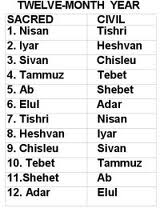Hebrew calendar – the calendar used by the Jews; dates from 3761 BC (the assumed date of the Creation of the world); a lunar year of 354 days is adjusted to the solar year of 365 days by periodic leap years.
lunisolar calendar – a calendar based on both lunar and solar cycles
Tishri – the first month of the civil year; the seventh month of the ecclesiastical year in the Jewish calendar (in September and October)
Heshvan – the second month of the civil year; the eighth month of the ecclesiastical year in the Jewish calendar (in October and November)
Chislev, Kislev– the third month of the civil year; the ninth month of the ecclesiastical year in the Jewish calendar (in November and December)
Tebet, Tevet – the fourth month of the civil year; the tenth month of the ecclesiastical year (in December and January)
Shebat, Shevat – the fifth month of the civil year: the eleventh month of the ecclesiastical year in the Jewish calendar (in January and February)
Adar – the sixth month of the civil year; the twelfth month of the ecclesiastic year in the Jewish calendar (in February and March)
Adar Sheni, Veadar – included seven times in every 19 years
Nisan, Nissan – the seventh month of the civil year; the first month of the ecclesiastic year (in March and April)
Iyar, Iyyar – the eighth month of the civil year; the second month of the ecclesiastical year (in April and May)
Sivan, Siwan – the ninth month of the civil year; the third month of the ecclesiastical year in the Jewish calendar (in May and June)
Tammuz, Thammuz – the tenth month of the civil year; the fourth month of the ecclesiastic year (in June and July)
Av, Ab – the eleventh month of the civil year; the fifth month of the ecclesiastical year in the Jewish calendar (in July and August)
Ellul, Elul – the twelfth month of the civil year; the sixth month of the ecclesiastical year in the Jewish calendar (in August and September)

